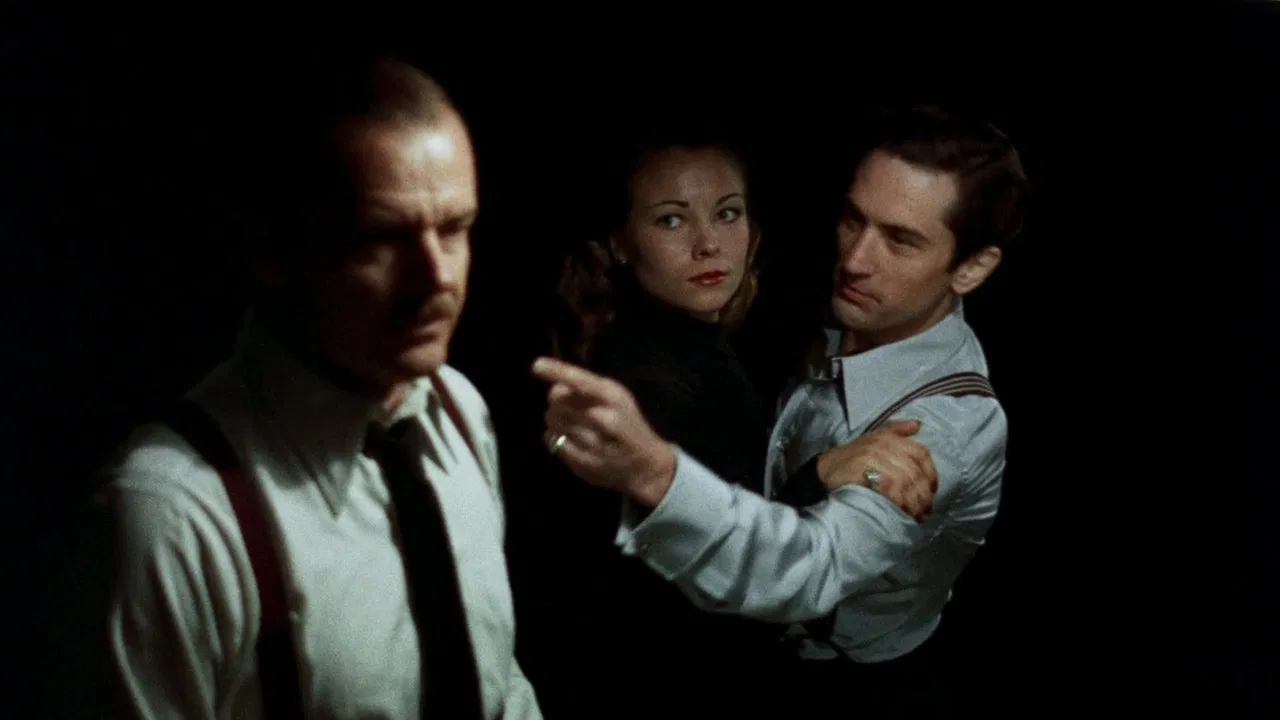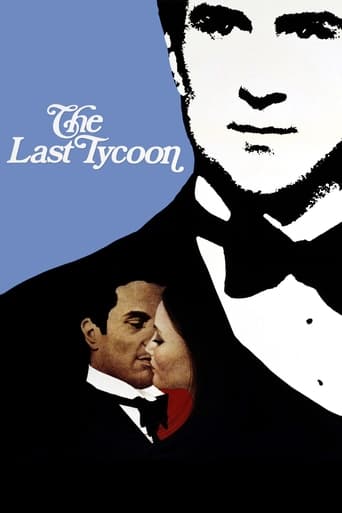

Film Review: "The Last Tycoon" (1976)The last picture show of Director Elia Kazan (1909-2003), who takes F. Scott Fitzgerald's unfinished novel from 1941, adapted for the screen with help of screenwriter Harold Pinter (1930-2008), puts his signature on slow-burning intense character struggles in the Golden Era of Hollywood of the 1930s scenarios, where film studio executive Monroe Stahr, performed by beats underlining, matured-in-isolation actor Robert De Niro, who runs through the film like a train, taking on every obstacles as well as presented opportunities by encountering several women, choosing arguably the false kind to lose balance entirely, over his calmly received incomplete beach house of bliss; masterfully visualized in straight, uncompromising shots in scenes as Monroe's meeting with Mid-Western Writer Brimmer, portrayed by ultra-relaxed actor Jack Nicholson; in an evening of drinking, dining and ping-pong gaming, before a high-pitched hit strikes into this action-denying, quiet and classic drama-indulging two-hour-film about a life of executive producers, following furthermore actor Robert Mitchum (1917-1997) as wise-looking, yet office-women-intercoursing character of Pat Brady, his daughter Cecilia Brady, given face by 18-year-old actress Theresa Russell, who would have been the choice for a future wife in Monroe Stahr's position in order to come to terms of peacemaking. Nevertheless "The Last Tycoon" produced by the director's long-time-benefactor Sam Spiegel (1901-1985) does miss the universal messages for a wider audience to connect to, as the equally-titles 2016 TV show of 9 episodes, which needed exceeding thrills for the character of Monroe actually wants to get out, breaking free of it all, recalling the more-accomplished entertaining picture by Robert Altman "The Player" (1992, which finds satire beats to fight the here-centered black and white cinematic film-in-film moments between world-famous supporting cast Jeanne Moreau & Tony Curtis that probably can only be fully enjoyed by people, who have made the experience in producing some kind of visual-storytelling project in their lives, where the relentless, unforgiving force becomes evident that chances of happiness within are fleeting moments; suddenly there, gone forever, before the cycle renews itself.© 2017 Felix Alexander Dausend (Cinemajesty Entertainments LLC)
... View MoreI can't write too much here, firstly, because after seeing this film, my head is crammed with so much I want to say, and yet with so much still lurking in the background...This is the true reason why films should be made, and what should motivate filmmakers- something much more spiritual and humane, that just profit returns...One magnificent last "Good Buy" from true genius filmmaker, who during his loud career had seen it all, and retained that white, clean core - the soul, the ideal, you name it! So many nuances, tones, subtexts that you cannot explain with words, but react to them like lightly touched strings. Very brilliant and touching movie, and definitely should be a handbook for future prodigies, and those ones that work independent. I am done
... View MoreIf I recall correctly, this was the last movie to be directed by Elia Kazan, who had an illustrious career in American show business as an acclaimed stage writer and director on Broadway as well as a successful Hollywood director. 'The Last Tycoon' was meant to be his swan song, of sorts. I saw this movie at the cinema when it was first released in 1976 with an old boyfriend and I don't think that either of us knew what to make of it. I then read the novel by Scott Fitzgerald. It was Fitzgerald's last notable work, noted most of all because he died before he could complete it. Comparisons to 'The Great Gatsby' are sadly inevitable, and I didn't find 'The Last Tycoon' to be as good. (But what book ever is?) I hired the movie on rental many years later and thought it was stilted and too impressed by its original source material and couldn't understand why I might have recalled something so (un)memorable.Anyway, the story concerns the rise and fall of Monroe Stahr, a movie mogul whom Fitzgerald based upon the legendary Hollywood figure of Irving G Thalberg. The usual Hollywood generic characters make a showing, the gruff studio head, minions looking to get ahead etc, played by some famous names in miniscule parts (ie Dana Andrews, Tony Curtis), as if it was a mark of status to take part in Kazan's last project for the screen. Robert de Niro looking very young, I think was miscast by Kazan to play Stahr; his performance is strictly one-note and not very lively. A young ingénue making her film debut, Ingrid Boulting, who plays a woman that Stahr becomes obsessed with, got the thumbs down from audiences and critics for being too beautiful to act, whilst a feisty turn from Angelica Huston before she became well known, got a lion's share of the attention. Robert Mitchum, and Ray Milland also have supporting parts but like Andrews and Curtis, it seems a waste of time - dare I say it, a gimmick of casting, to have them in the film at all.Theresa Russell appears as Robert Mitchum's daughter, and she is the Nick Carraway of this story, observing the tragic predicaments of those around her and vowing that she has learned something about life's pitfalls, from carefully observing the mistakes Monroe Stahr and others in the story have made. Since the original source material was never finished, I actually cannot remember the kind of ending they had to tack onto 'The Last Tycoon'. I think Stahr, after his unhappy love affair leaves the studio never to return. In reality, Thalberg was in ill-health for most of his life and died young after being married to actress Norma Shearer - his Hollywood reputation is legendary but you would never know why after not knowing anything about him, and then watching this film.This is one of those films that one finds difficult to get involved with as you cannot see the point of why it has been made. In this case it is unfortunate because the project had everything going for it, but it did not turn out as well as either audiences or critics had anticipated, and sadly comes off as an unnecessary vanity project on behalf of Kazan reaching the sunset of his illustrious career in movies.
... View MoreFor a little while as I watched the Last Tycoon, I thought I could understand what the critics said of this film when it first came out (the majority of them I mean). The screenplay, written by Harold Pinter from what is supposedly a much richer (albeit incomplete) text from F. Scott Fitzgerald, stages many scenes like how one would see on a theater stage, with only one or two little directional differences with Elia Kazan's take on the material. This, plus its slightly 'dry' style (i.e. very little musical score, limited camera movement, performances kept without much, if at all, improvisation), makes things seem almost too much in the realm of the naturalistic, of drama kept to a minimum of interaction.But as the film went along like this, I started to notice something: the sort of coldness, almost a loneliness, with the character of Monroe Stahr, is what actually makes a lot of the movie work for all its intents and purposes. It has the veneer of being a little distanced, of not having the full driving force of drama and comedy (although it does have both of those in bits and pieces, more as little familial or romantic drama or one-line throwaways) like an 8 1/2 or the Player with dealing in the problems of a professional in the film industry. But because of Stahr's method of practices, of being as Mitchum's character describes "like a priest or a rabbi, 'this is how it will be'", when he's told 'no' it shatters him. As a film about loss, and the very calculated realization that his code in business spills over into the personal, the Last Tycoon does work.Maybe not very well, but work it does, as storytelling and as a character piece. Sure, it might not be De Niro's best, but he does deliver subtle like it's as second nature as breathing (kind of a twist on his other 1976 character, Travis Bickle, whom he played subtle but also crazy, where as here it's subtle and empty), and he's got plenty of backup. There was some critical flack for the actress Ingrid Boutling, playing the nearly obscure object of Monroe's desire-cum-demand, but she too is better than she was given credit for, at least within the range she's allowed to work in (which, granted, isn't as much as one might think, but she's seen not as a fully-fleshed person but as someone with hints of a reality she needs and a fantasy world of movies she doesn't).Then there's Nicholson, showing up in the final reels for a couple of amazing scenes sparring with De Niro, barely ever raising voices for a low-key one-on-one as a movie exec and communist writer organizer. Not to forget Mitchum, in maybe his last good performance, and Theresa Russell in also an underrated turn as a woman grown up way past her years. Did I mention Jeanne Moreau? She's Moreau, that's about it, playing a completely self-absorbed star for all its one dimension is worth. Only Tony Curtis, with his libido problems isn't par for the course, and Donald Pleasance has a shaky (if darkly funny) scene as a scorned writer.Does the Last Tycoon have some problems as feeling like compelling historical drama? Sure. But does it somehow get into the atmosphere of its character in the context of his profession, revealing all that's absent for him every day coming home to his Asian butler? Absolutely. It's a mix and match that will disappoint some, and for those who want to take the chance on a somewhat forgotten 70s film- Kazan's last and Spiegel's final ego-tickler- might be even more impressed than I was. 7.5/10
... View More